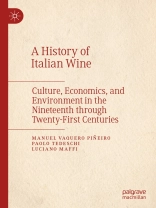This book analyzes the evolution of Italian viticulture and winemaking from the 1860s to the new Millennium. During this period the Italian wine sector experienced a profound modernization, renovating itself and adapting its products to international trends, progressively building the current excellent reputation of Italian wine in the world market.
Using unpublished sources and a vast bibliography, authors highlight the main factors favoring this evolution: public institutional support to viticulture; the birth and the growth of Italian wine entrepreneurship; the improvement in quality of the winemaking processes; the increasing relevance of viticulture and winemaking in Italian agricultural production and export; and the emergence of wine as a cultural product.
Tabela de Conteúdo
1. Why a Comprehensive History of the Italian Wine?.- 2. Institutional Innovation and Public Policies.- 3. Winemakers.- 4. Production, Trade, and Consumption.- 5. Italy Tasting: Wine, Tourism, and Landscape.
Sobre o autor
Manuel Vaquero Piñeiro is Associate Professor in Economic History at the University of Perugia, Italy. He studies Economic and Social History, with particular attention to agriculture in late-nineteenth-century Italy.
Paolo Tedeschi is full Professor in Economic History at the University of Milano-Bicocca, Italy. His studies focus on Italian Economic History and the European integration process, in particular the evolution of the agricultural sector.
Luciano Maffi is a Lecturer in Economic History at the University of Parma, Italy. He studies agricultural and food production in Modern and Contemporary History, with a focus on viticulture and wine production.












